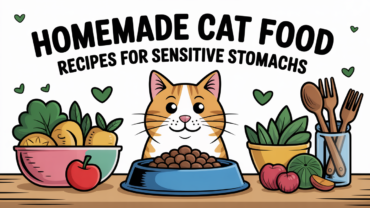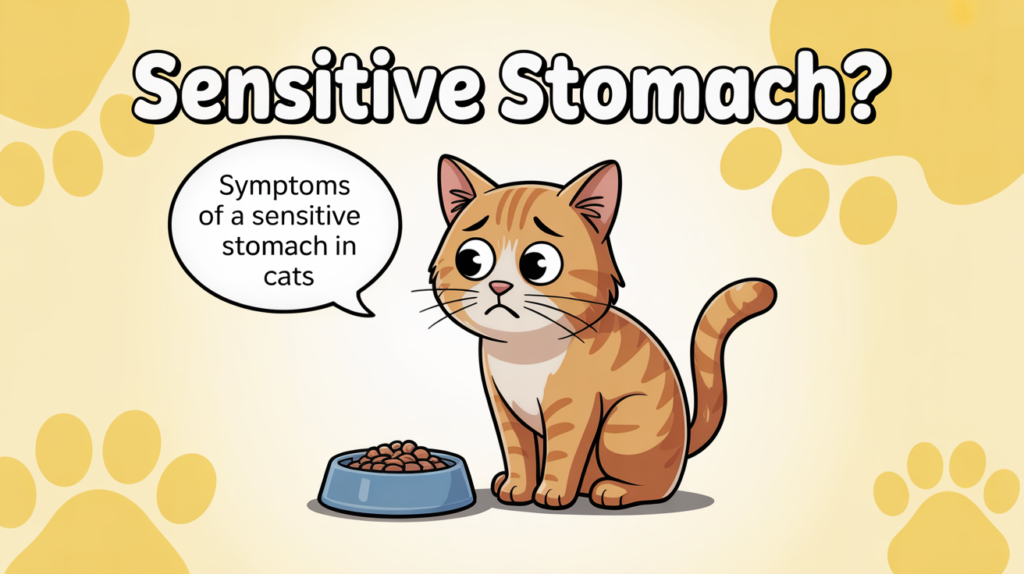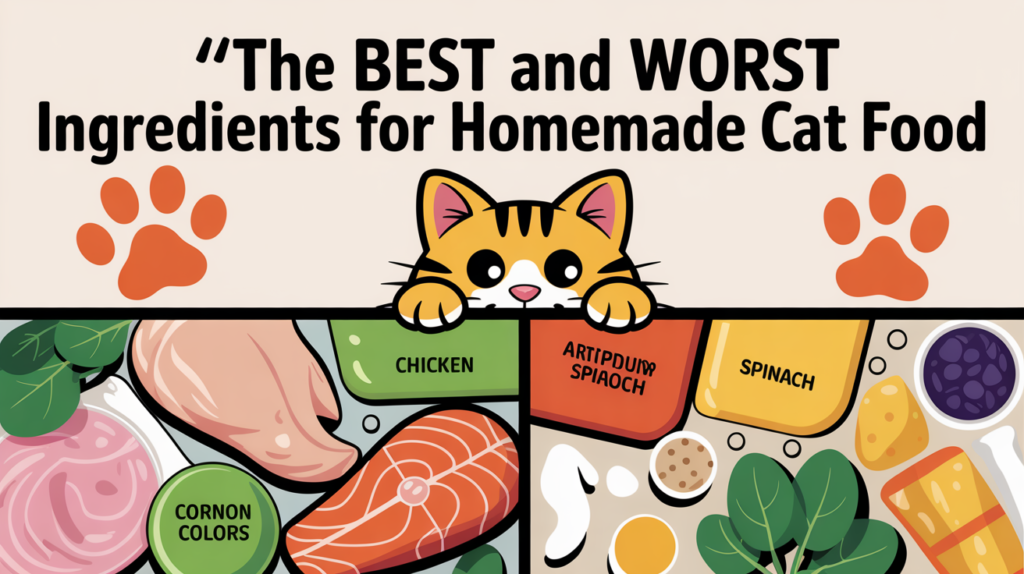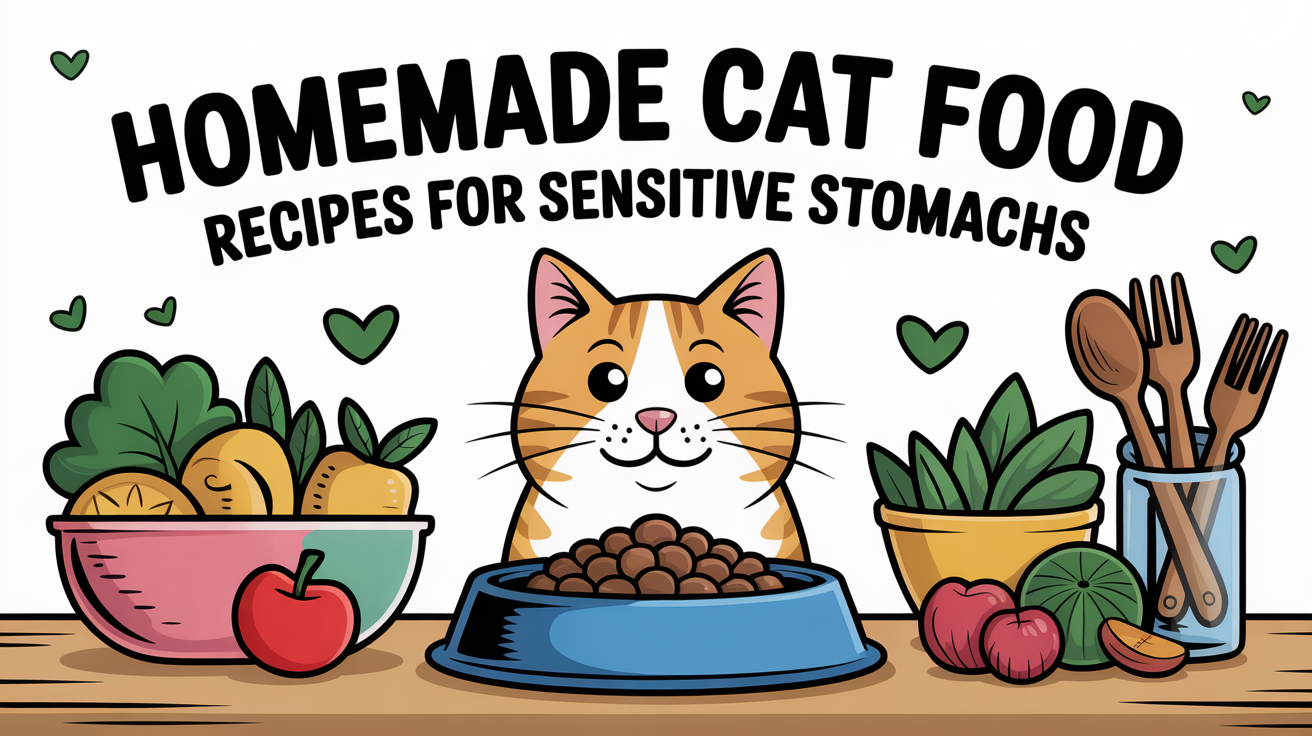We research popular pet products, vet-reviewed sources, and customer feedback to help you make informed decisions.
This post contains affiliate links. As an Amazon Associate, we earn from qualifying purchases. Prices and availability are subject to change.

Why Choose Homemade Cat Food for Sensitive Stomachs?
Cats with sensitive stomachs can be tricky to feed. Commercial options often contain additives, artificial preservatives, or ingredients that can upset their delicate digestive systems. Homemade cat food offers complete control over what goes into your feline’s bowl, helping reduce gastrointestinal irritation, allergic responses, and even behavioral issues stemming from food sensitivities.
Homemade doesn’t mean complicated. In fact, creating cat food recipes at home can be surprisingly simple, highly nutritious, and incredibly rewarding. Let’s break it down.
Symptoms of a Sensitive Stomach in Cats: What You Need to Know

Understanding the root cause of stomach sensitivities is essential before switching your cat’s diet. Common signs include:
- Frequent vomiting or regurgitation
- Diarrhea or loose stools
- Excessive flatulence
- Decreased appetite or pickiness
- Weight loss or poor coat quality
Did you know that anxiety in cats can also affect digestion? Learn more about the connection in our cat anxiety guide.
The Best and Worst Ingredients for Homemade Cat Food
Choosing the right ingredients is half the battle. Here are essentials and red flags:

Safe & Beneficial Ingredients
- Boiled chicken or turkey (boneless, skinless)
- White rice or pumpkin (easy on digestion)
- Salmon oil (for healthy coat)
- Taurine supplement (essential amino acid)
Ingredients to Avoid
- Onions and garlic
- Raw bones or raw egg whites
- Dairy products
- Artificial flavors or preservatives
3 Vet-Approved Homemade Cat Food Recipes for Sensitive Stomachs
Below are three simple yet effective recipes that support your cat’s digestive health:
1. Chicken & Pumpkin Bowl
Ingredients:
- 1 cup boiled chicken breast (shredded)
- 2 tbsp plain canned pumpkin
- 1 tsp salmon oil
- 1/8 tsp taurine supplement
Instructions:
Mix all ingredients thoroughly and serve at room temperature.
2. Turkey & Sweet Potato Mash
Ingredients:
- 1 cup cooked ground turkey
- 1/4 cup mashed sweet potato
- 1/8 tsp taurine
Instructions:
Blend until smooth. Store in airtight containers.
3. White Fish & Rice Blend
Ingredients:
- 1/2 cup cooked cod or tilapia
- 1/4 cup plain white rice
- 1/8 tsp taurine supplement
Instructions:
Mash together with warm water to desired consistency.
Kitchen Tools That Make Cat Food Prep Easier
Preparing homemade cat food becomes effortless when you’re equipped with the right tools. Here are two highly recommended Amazon picks that simplify storage, cooking, and portioning:
Want more inspiration? Follow us on Pinterest for recipe boards, product picks, and feline wellness tips.
Is Homemade Cat Food Nutritionally Complete?
Cats require specific nutrients such as taurine, vitamin A, and arachidonic acid that must be present in the right amounts. When preparing food at home, you may need to:
- Use a taurine supplement regularly
- Rotate protein sources
- Add fish oils or bone meal (only with vet approval)
If you’re unsure, consult a veterinary nutritionist to develop a balanced feeding plan.
Common Mistakes to Avoid When Making Cat Food
Even well-meaning pet owners can make errors. Here are some things to watch for:
- Skipping essential supplements (especially taurine)
- Using unsafe ingredients like garlic or onion
- Poor storage practices (refrigerate or freeze within 2 hours)
- Feeding too much fat or carbs
Avoiding these mistakes ensures your cat stays healthy, happy, and full of purrs.
Pros and Cons of Homemade Cat Food
| Pros | Cons |
| Total control over ingredients | Needs careful balancing |
| No preservatives or additives | Time-consuming to prepare |
| Customizable for sensitivities | Can be expensive depending on meat |
| Can reduce vet visits long-term | Requires supplement knowledge |
FAQ: Homemade Cat Food for Cats with Sensitive Stomachs
Q1: What is the best homemade cat food for cats with sensitive stomachs?
Simple recipes like boiled chicken with pumpkin or rice work best.
Q2: Can cats eat homemade food every day?
Yes, if it’s nutritionally complete and approved by a vet.
Q3: Should I add rice to cat food recipes?
Rice is a gentle carbohydrate that helps bind loose stools.
Q4: Can stress cause digestive issues in cats?
Absolutely. Learn more in our anxiety and digestion post.
Q5: How do I start transitioning my cat to homemade meals?
Start by mixing homemade food into your cat’s current diet over 7-10 days.
Final Thoughts: Make the Switch with Confidence
Choosing homemade cat food isn’t just a lifestyle upgrade for your pet—it’s an act of love. You gain control, peace of mind, and the ability to tailor your cat’s diet to their unique needs. Just remember:
- Always consult your vet before switching diets
- Use high-quality ingredients and trusted recipes
- Supplement as needed to ensure balance
📌 Don’t forget to follow us on Pinterest for more cat food recipes, tools, and feline care advice.
As an Amazon Associate, I earn from qualifying purchases. Prices and availability are subject to change.
If you found this post helpful, share it with fellow cat parents and explore more on our blog!




